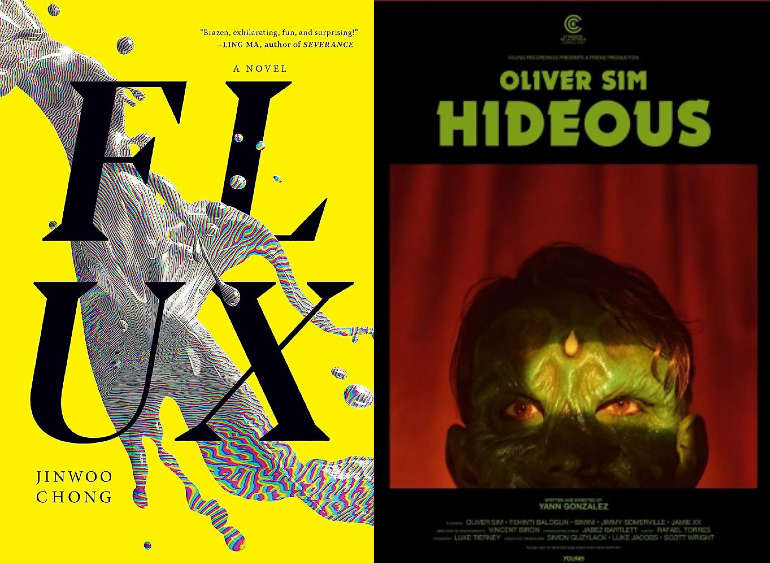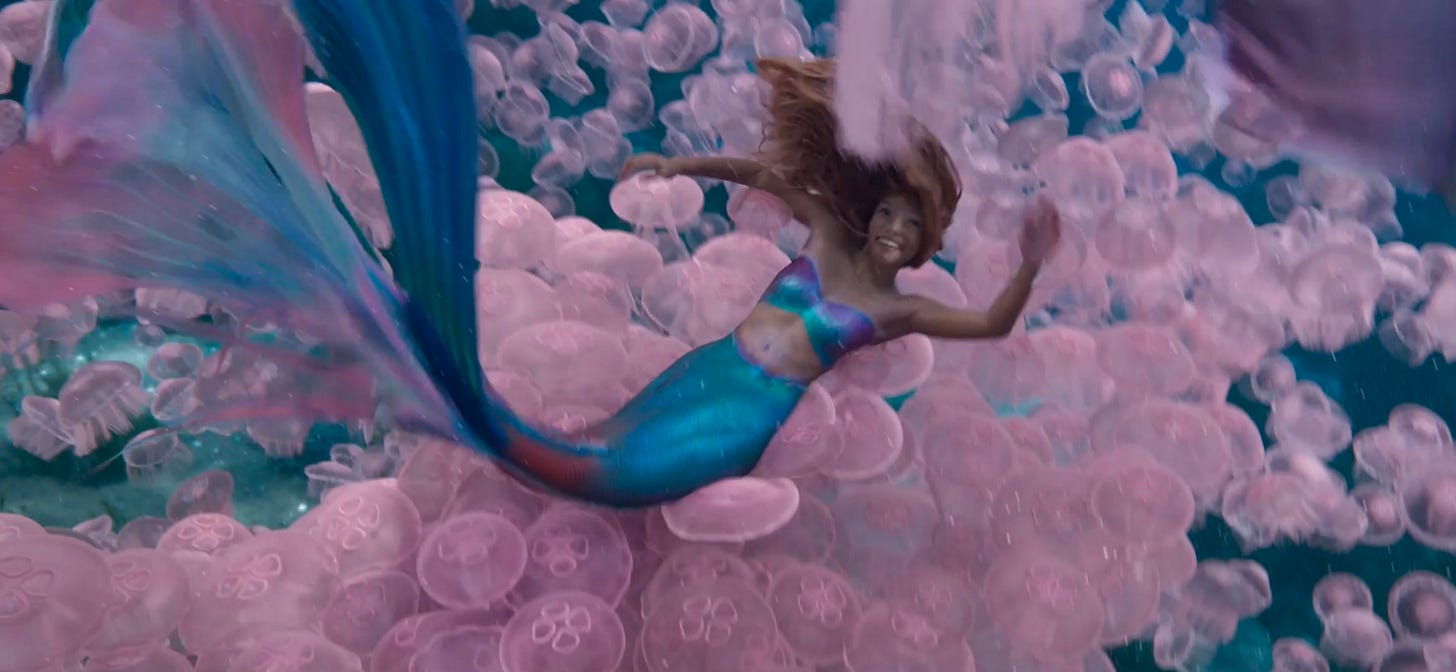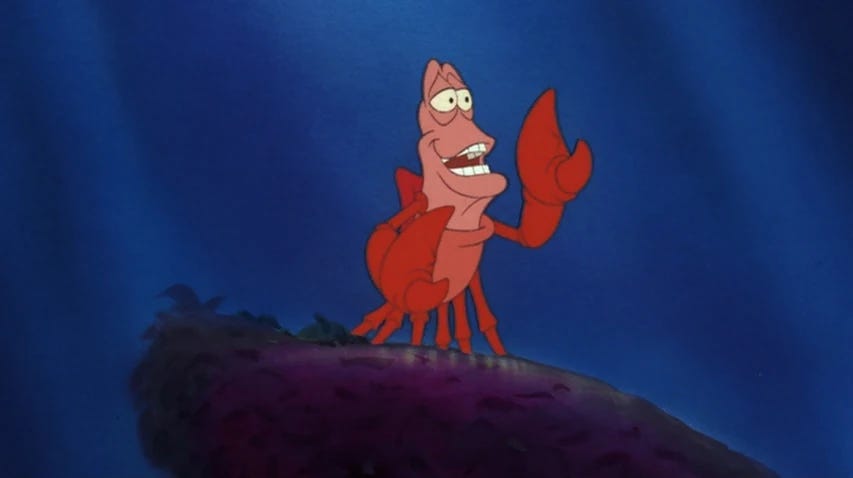I stand before you reveling in the pleasure that my AMC A-list pass has brought me this month. Within the fruits that spring from that exquisite joy are stories that deal with the volleying relationship between performer and viewer, the pain of self-replication, and also a talking crab. Behold!
Hideous, Yann Gonzalez, 2022 (streaming on Mubi)
This incandescent musical is a multimedia three-act short with a script and music by Oliver Sim of The xx, who also stars as the Artist. An explicit HIV parable and a Jarmanesque tribute to B movie grotesquerie, Hideous depicts a televised interview between the Artist and a stylish late night host, and its reverberations as the interview becomes increasingly revelatory. Also featured is Jimmy Sommerville, the soulful falsetto and songwriter responsible for one of the most evocative anthems of hideousness and flight.
I loved the precise rendering of the relationship between artist and viewer, portrayed in the child who is immediately delighted by seeing the Artist on television, and his knowing mother as a gentle witness to this future key memory. Even the nature of the piece as an extremely hummable musical gets at the cycle in this relationship of viewing and re-viewing. Hideous got me thinking about Jinwoo Chang's recent debut novel, Flux, a similarly ambitious story that explores that same relationship, though from the other side. In Flux, Brandon is a caustic loner who addresses his story to an amalgam of a now-canceled (fictitious) actor and the character he played in a cult '80s television show. Flux is not necessarily an analysis of the parasocial; Brandon is well-aware of the one-way nature of their VHS-based relationship. But like many of us who spent childhood orbiting the television, he is best able to access parts of his identity—his queerness, his Asian-Americanness—through the comfortable and often tenuous distance of media representation.
Both the Artist and Brandon have internalized hideousness that has been ascribed to them—and potentially acted hideously, depending on how literally you take the climax of Hideous. The coming-of-age film essay is an entire genre of personal memoir, with the usual narrative that some strangeness on screen made the author accept the strangeness within them. But Flux and Hideous go deeper, examining the instincts that lead us to connect to certain aesthetic representations, and reacting to the kinetic pleasure of active watching and rewatching rather than the passive, nonstop consumption we're encouraged to participate in. They offer a crystalline understanding of the dangers not just of being perceived but interpreted, or as Sim croons: "Radical honesty/might set me free/if it makes me hideous."
You Hurt My Feelings, Nicole Holofcener, 2023 (in theaters)
I wanted so badly to enjoy You Hurt My Feelings, a New York picture about a happily married writer (Julie Louis-Dreyfus) who discovers her husband doesn't actually like her latest book. You Hurt My Feelings is a portrait of middle-aged mediocrity and has some interesting things to say about how much we tie our self-worth to our self-production but the endeavor is undercooked from the start. The slow, stilted dialogue reminded me of the videos that accompany a language textbook, where the camera starts rolling just as a character walks into the room and proclaims their plans to procure an ice cream cone. In place of chemistry, characters have quirky microbehaviors that their partner can fixate on—JLD's open-mouthed cookie-eating, her brother-in-law's (Arian Moayed) love of good wool socks—but the film's failure to make these relationships feel any deeper than the well-intentioned camaraderie of acting class scene partners makes it hard to invest in its stakes.
Sanctuary, Zachary Wigon, 2023 (in theaters)
An 80s erotic thriller infused with a screwball sensibility, Sanctuary is the sexy movie for grown-ups that op-ed writers/Letterboxd users have been longing for. The always magnificent Christopher Abbott plays Hal, the heir to a luxury hotel chain who constructs elaborate sadomasochistic fantasies with his dominatrix, Rebecca (Margaret Qualley). When he inherits the chain and attempts to change the terms of his relationship with Rebecca, the two enter a psychosexual battle for Hal's soul—or his company shares, whichever comes first. Qualley makes a strong case for herself as an actress with talents outside of the family name, her breathless staccato a perfect counterpoint to Hal's slow wit.
The Boogeyman, Rob Savage, 2023 (in theaters)
Definitely a real movie. This Stephen King short story adaptation about two sisters grieving the sudden death of their mother hits all the genre tropes: big spooky house, neglectful parents, schoolyard bullies. All of it is done perfectly adequately but there is literally nothing here that's not straight from the Steph King bargain bin.

The Little Mermaid, Rob Marshall, 2023 (in theaters)
I already discussed some of the circumstances around this movie and Spider-Man: Across the Spider-Verse but I have some thoughts on these movies not as nostalgia devices but as pieces of art.
The center of The Little Mermaid’s problems is the blank hole that is Ariel, despite Halley Bailey’s unimpeachably stunning voice and definite star quality. Bailey's acting actually reminded me of another singer-turned-actress, Jennifer Lopez, in their shared sweet-bordering-on-saccharine babygirl vocal affect. Like Lopez's worst characters, Ariel's entire schtick is that she is not good, not bad, just nice. But Ariel is of course not a character, she's a product, and so the dully manic pixie princess is less a performance choice and more a studio calibration to make Ariel as unobjectionable as possible.
Much has already been levied against the compulsory cornball Lin-Manuel Miranda rap and the stultifying ballad written for Prince Eric that sounds like Jack Donaghy wrote a sea shanty in fifteen minutes. I have little add, though I do think the film improves on the remake in one way in Sebastian, the crustaceous sycophant I always found utterly, repulsively undignified; Daveed Diggs brings surprising warmth and vulnerability to the CGI crab.
Spider-Man: Across the Spider-Verse, Phil Lord, Christopher Miller, and Dave Callaham, 2023 (in theaters)

This might be the first comic book movie I've endorsed in the newsletter. Shameik Moore gives a stand-out vocal performance as an older, less wide-eyed Miles, and I love the promise made at the end to further explore the more sinister dimensions of this character. The movie does feel long, in part because of the abrupt ending, but while the dragging middle bits might help position future spin-offs and tie-in the live action films, they do little for the story. While I'm not expecting abolitionist politics from my big budget kids' cartoon, the omnipresent deification of the police feels increasingly ridiculous in a series that claims to be rooted in Black and Brown experiences of New York—one has to wonder what Papa Morales thinks of Miles's BLM pin.









The boogeyman looked like it was gonna be soooo scary from the trailer and then it was truly so mid lol.